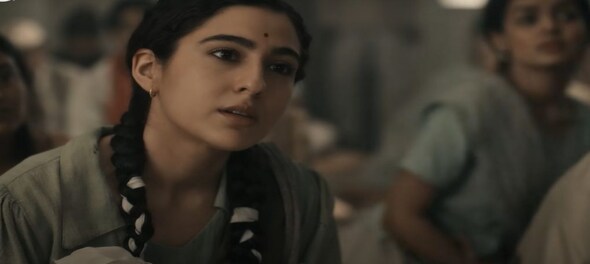
Kannan Iyer’s new film, headlined by a stilted, distractingly over-the-top Sara Ali Khan, is the textbook recipe for a cinematic disaster.
It has all the ingredients—saccharine performances, wooden dialogues, mawkish music, stuffy sets, strained staging, underlined melodrama, and squandered potential. Ae Watan Mere Watan is the latest entry in a rapidly growing list of Hindi films so myopic in their imagination and execution, they wouldn’t win even a senior school skit competition.
Produced by Dharmatic Entertainment, the streaming arm of Karan Johar’s Dharma Productions, it is based on the life of Usha Mehta and the underground radio that she helped build and illegally ran in the early 1940s to spread the message of unity and rebellion among Indians and revitalise the Quit India Movement when the British had banned the Congress Party and incarcerated all its major leaders.
Blunders galore in Ae Watan Mere Watan but the biggest of them all is Khan's (mis)casting in the titular role. It’s her ninth film and yet again she gives a forced, labored performance. The sheer magnitude of her effort is so grating, that you can see it weighing her down in every scene. She sticks out as the sore thumb, instantly shattering the make-belief that everyone and everything around her is trying hard to build. It’s as if she has mistaken acting for overacting and cannot tell the difference anymore.
Her casting begets asking—why? Especially in a historical biopic of a lesser-known revolutionary who served as a crucial cog that set the wheel of the freedom struggle rolling. It’s an important story of a young woman who selflessly sacrificed her youth for a cause much larger than her. Usha Mehta’s life demanded a responsible telling. I’m terribly curious about which of Khan’s earlier performances convinced the honchos at Dharamatic that she was the best choice for this role. Simmba? Love Aaj Kal? Coolie No. 1? Or the most recent Murder Mubarak? Not even some of her relatively better performances make her eligible for a role as compelling as this.
I couldn’t help but think of Happy Bhaag Jayegi and Bareilly Ki Barfi while watching Ae Watan Mere Watan. Both these films had a woman at the center but the heroines who played them hadn’t come into their own until the release of these movies. However, the filmmakers more than made up for it by amply cushioning these films with a potent combination of two other extremely talented actors.
Happy Bhaag Jayegi had a wonderful Abhay Deol and Ali Fazal. Meanwhile, Bareilly Ki Barfi brought on board the winsome twosome of Ayushmann Khurrana and Rajkummar Rao. They ramped up the fun so uproariously that they made you overlook the empty center.
If only Ae Watan Mere Watan was half as clever. It places Khan right at the front and center of every scene, making it a painful watch. Add to it Darab Farooqui’s excruciatingly silly dialogues. Sample some. At one point, Usha, all of 22, says “The antidote to the addiction of lies is truth.” In another scene, her old aunt, trying to cheer them up, says, “What is this smell in the room? Oh, it’s the smell of your disappointment.”
One more. The last, I promise. In his introductory scene, star freedom fighter Ram Manohar Lohia (Emraan Hashmi) declares, “However many matchsticks may blow out, the fire in our hearts will never die.” Who talks like that?
What Ae Watan Mere Watan does beautifully is squander several interesting possibilities. Like exploring the simmering conflict between a Gandhian Usha and her pro-empire father. Like examining the rebellion of youth or whether youth itself is the rebellion.
A film on the founding and impact of Congress Radio, a mighty medium of mass dissemination when technology in India was still nascent, it could also have been a rife commentary on media control and censoring by governments or how the influence of social media today in turning electoral tides is only an extension of what happened during those final, violent years before the Indian independence.
But instead of crafting full-blooded characters, Iyer uses them as a mouthpiece spouting intel in the name of conversation. Everyone, whether it be Usha, her fellow revolutionary friends Kaushik (Abhay Verma) and Fahad (Sparsh Shrivastav), or Ram Manohar Lohia, is pitiably unidimensional. We are never let in on anything about them other than their all-consuming fire to see India free. Except for Kaushik. Pretty as a postcard, he also happens to be deeply in love with Usha.
We’re so used to seeing Hashmi play grey with such delicious wickedness, that his straight-jacketed turn as Lohia—although he does breathe some life into the film—is far from interesting. Meanwhile, Shrivastav, the breakout actor from Kiran Rao’s recent Laapataa Ladies, is terrific here too as the crippled Azad but he can do only so much with a script that’s beyond salvageable.
Ae Watan Mere Watan is full of weird, awkward scenes. Two stand out most starkly. One has Mahatma Gandhi asking of his disciples a vow of celibacy. Usha is the first one to volunteer. In another scene, Fahad and Usha fight over who will do the final broadcast, knowing fully well that a torturous death is certain. The way they arrive at a decision is laughably ludicrous. I don’t want to reveal too much and spoil it for you. What if you want to watch the film? It’s available for streaming on Prime Video.
(Edited by : Anand Singha)
Check out our in-depth Market Coverage, Business News & get real-time Stock Market Updates on CNBC-TV18. Also, Watch our channels CNBC-TV18, CNBC Awaaz and CNBC Bajar Live on-the-go!


Prajwal Revanna Sexual Assault Case: Activist raises concerns over political interference, delayed investigation in the matter
Apr 30, 2024 10:17 PM
Lok Sabha Election 2024: Baramati election outcome will decide the future of Pawar dynasty, says expert
Apr 30, 2024 10:08 PM
Lok Sabha elections 2024: Baramati to Mainpuri, key battles in phase 3
Apr 30, 2024 7:01 PM

